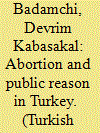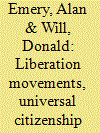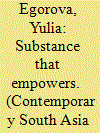| Srl | Item |
| 1 |
ID:
129558


|
|
|
|
|
| Publication |
2014.
|
| Summary/Abstract |
During May and June 2012, the question of abortion was hotly debated in Turkish public forums. This paper analyzes the main characteristics of this abortion debate using John Rawls's conception of public reason as a normative framework. In doing so, speeches and declarations on abortion made by legislators are critically evaluated. The arguments in the debate are examined with a view to interpret how the issue should be discussed as far as the demands of public reason are concerned. From a Rawlsian framework, it is observed that the pro-ban position (Adalet ve Kalk?nma Partisi) is far from contributing to a reasonable balance of political values on abortion whereas the contra-ban position (Cumhuriyet Halk Partisi) satisfies the demands of public reason. Moreover, it is argued that, the latest proposed legislation on abortion cannot be viewed as an outcome of a reasonable balance of political values but is rather an outcome of pragmatic compromise.
|
|
|
|
|
|
|
|
|
|
|
|
|
|
|
|
| 2 |
ID:
131378


|
|
|
|
|
| Publication |
2014.
|
| Summary/Abstract |
How does a national liberation movement address the security fears of the Other to promote a democratic transition? We consider South Africa and Israel-Palestine apt cases for comparison as the intractability of each conflict derives in large part from a colonial settlement process that led to the creation of ethno-nationalist states. Similarly the manner in which the liberation movements have defined themselves and the Other accounts in part for the successful transition in South Africa and the lack thereof in Israel-Palestine. In the Palestinian case collective intra-movement struggles framing the post-liberation state in exclusive terms have reinforced a predilection by Israelis to fight, leading to an ongoing stalemate and violence; in the South African case framing the post-liberation state in inclusive terms initiated a cycle of movement-Other concessions and democratisation. Our study suggests that universalistic democratic principles codified in public charter will function as a 'master frame' applicable to divided society struggles.
|
|
|
|
|
|
|
|
|
|
|
|
|
|
|
|
| 3 |
ID:
124959


|
|
|
|
|
| Publication |
2013.
|
| Summary/Abstract |
Drawing on two ethnographic examples of the sociocultural aspects of populations genetic research in India, the article explores in what ways tests aimed at assessing 'genetic differences' between populations can be viewed as enabling or disempowering for individuals, communities or nations subjected to such tests. The first builds on a response to DNA research demonstrated by the leaders of the Jewish Bene Ephraim community of Andhra Pradesh, a Dalit group who in the late 1980s declared their descent from the Lost Tribes of Israel. The second focuses on the Indian Genome Variation Consortium, a research network established in India in 2003 with the aim of mapping the country's human genetic diversity. Building upon Prainsack and Toom's theoretical concept of situated dis/empowerment, I suggest that in both case studies empowering and disempowering elements of DNA testing appear to co-constitute and co-produce each other, as they both reinforce reductionist accounts of human sociality and serve as rhetorical tools for social and political liberation.
|
|
|
|
|
|
|
|
|
|
|
|
|
|
|
|